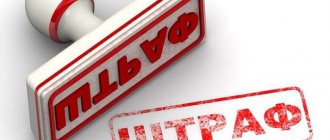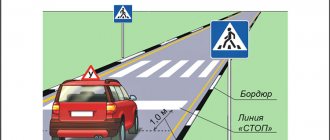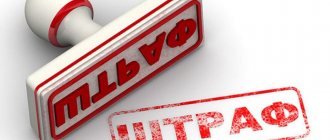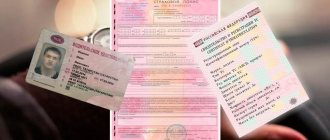Minor violations cost the driver from 500 rubles, medium ones - from 10,000. A person who is caught driving drunk or decides to drink after an accident receives a punishment: deprivation of his license for 1.5-3 years and a fine of 30,000. “Which fines can be paid with a 50 percent discount” - a table by which you can check whether your violation is included in this list. Another way to find out is to open the traffic police website. Information about the benefit is published immediately.
We'll tell you what fines qualify for a 50% discount
What fines can be paid with a 50 percent discount?
Federal Law of the Russian Federation dated December 22 No. 437-FZ was supplemented with part 13 in article 32.2. The changes concern the payment of only half of the fine. The action applies to Chapter 12 of the Code of Administrative Offences.
Table: “Which fines are subject to a 50 percent discount”
| Article in the Code of Administrative Offenses of the Russian Federation, Chapter 12 | The essence of the violation | Description |
| 12.1 | The car did not pass registration and technical inspection. | The discount does not apply to repeat violations. |
| 12.2 | Problems with state license plates. | The numbers must be legible at all times from a distance of 20 meters. During the day - all the signs, at night - at least one. Dirty or partially obscured (but clear letters or numbers) will also result in prosecution. |
| 12.3 | Driving a vehicle without documents or transferring control to a person without documents. | The driver does not have registration documents with him and cannot confirm ownership. No insurance policy. Before you transfer control to another person, you need to check his papers. |
| 12.4 | A vehicle with lights or sound signals installed without permission. | Taxi color schemes, taxi lights, “Disabled” sign and others. They have the right to hold people accountable even if the car was not involved in road traffic, but was simply parked in a garage. |
| 12.5 | The vehicle is faulty and the “Disabled” sign has been installed illegally. | The driver uses a vehicle that is prohibited for operation or has a faulty brake system. |
| 12.6 | Seat belts, motorcycle helmets. | The driver or passengers of the car are not wearing a seat belt. Motorcyclists and passengers ride without a helmet or with it unfastened. |
| 12.7 | Driving a vehicle by a driver who does not have the right to do so. | Exception: training ride. In other cases, management cannot be transferred to persons who do not have rights or have been deprived of them. |
| 12.9 | Exceeding the set speed. | Excesses and fines:
|
| 12.10 | Violation of railway traffic rules. | On the railway, overtaking, stopping, parking, reversing, and driving onto the rails when a train is approaching is prohibited. |
| 12.11 | Driving incorrectly on the motorway. | It is prohibited to drive on the motorway at a speed of less than 40 km/h, stop outside stop zones, and reverse driving is prohibited. |
| 12.12 | Driving through a prohibiting traffic light or a traffic controller's prohibiting gesture. | Traffic is allowed when the light is green, but when the light is yellow and red it is already a violation. |
| 12.13 | Violation of rules for driving through intersections. | The driver failed to give way to a vehicle with priority in traffic at an intersection. |
| 12.14 | Incorrect maneuvering. | The driver did not turn on the turn signal, turned from another lane, and drove in reverse in places where this maneuver is prohibited. |
| 12.17 | The driver does not allow fire trucks, ambulances or police vehicles with their alarm systems on. | The vehicle should not interfere with the free passage of vehicles with activated signal systems. |
| 12.18 | The driver does not allow pedestrians or cyclists to pass. | It is prohibited to overtake or get ahead of other cars at a pedestrian crossing. |
| 12.19 | Violation of the rules of stopping or parking a vehicle. | Stopping a car in the wrong place: at pedestrian crossings or closer than five meters from it. |
| 12.22 | Failure to comply with training driving rules. | The student must know the traffic rules, the instructor must have a certificate, and the car is equipped in accordance with the rules. |
| 12.23 | Violations of transportation of people. | The number of passengers is determined by the driver's license category. If there are discrepancies, a fine may be issued. |
| 12.29 | If a pedestrian violated the traffic rules. | Jumping to a red traffic light or crossing the road in the wrong place. |
| 12.37 | There is no compulsory civil liability insurance for vehicle owners. | No documents or violation of insurance rules. |
Article 32.2. Code of Administrative Offenses of the Russian Federation. Execution of the decision to impose an administrative fine
1. A feature of the execution of a decision to impose an administrative fine is that within the established period it can be paid by the person held accountable. This period is 30 days from the date the resolution comes into force (see commentary to Article 31.1) or from the date of expiration of the deferment period or installment plan (see commentary to Article 31.5).
2. If a decision to impose an administrative fine is made in relation to a minor who does not have independent income, then a decision is made to collect the fine from his parents or other legal representatives (see commentary to Article 31.8). In addition to parents, legal representatives of an individual are adoptive parents, guardians or trustees (see commentary to Article 25.3). Requirements for persons who can be appointed guardians or trustees are established by Art. 146 RF IC.
3. Execution of a decision to impose an administrative fine by a person held accountable means that the amount of the fine is paid to a bank or other credit institution or to a payment agent accepting payments from individuals, or to a bank payment agent. The fact of execution of the decision is confirmed by a copy of the payment document issued to the person making the payment of the corresponding amount.
4. In the absence of a notice of payment - a document indicating payment of the fine, after 30 days from the period specified in Part 1 of the commented article, the resolution is enforced. In this case, the relevant materials are sent by the judge, body, official who made the decision, to the bailiff.
In addition, an official of a federal executive body, a structural unit or territorial body, as well as another government body authorized to carry out proceedings in cases of administrative offenses (with the exception of a bailiff), draws up a protocol on the violation provided for in Part 1 of Art. 20.25 of the Code, in relation to a person who has not paid the fine (see commentary to Article 28.3).
5. The main legislative act establishing the procedure for the activities of bailiffs is Federal Law No. 229-FZ of October 2, 2007 “On Enforcement Proceedings” (as amended and supplemented).
It should be noted that according to Art. 30 of this Federal Law, within three days from the date of receipt of the enforcement document, the bailiff shall issue a resolution to initiate enforcement proceedings. This resolution establishes a period for the voluntary fulfillment of the requirements contained in the writ of execution, and it cannot exceed five days from the date the debtor receives the decision to initiate this proceeding.
6. According to Art. 98 of the said Federal Law, the recovery of wages and other types of income of the debtor (the person held liable) is applied when collecting an amount not exceeding ten thousand rubles.
Federal legislation establishes the order of collection of an administrative fine. In accordance with Art. 111 of the Federal Law “On Enforcement Proceedings” administrative fines are among the requirements satisfied in the fourth (last) priority. In addition, you must follow the rules provided for in Art. Art. 99 and 101 of the said Federal Law. It must be borne in mind that the employee must retain 50 percent of his earnings, regardless of how many executive documents are used to make deductions from wages and other income. It should be taken into account that there are types of income that cannot be recovered. Thus, there are situations when an administrative fine cannot be withheld from the wages and other types of income of the offender.
7. If an individual subject to an administrative fine does not work or the collection of the fine from his wages or other income is impossible, then the resolution is executed by foreclosure on property owned by the individual in the manner prescribed by federal legislation.
8. The procedure for foreclosure on funds and other property of the debtor is regulated by the Federal Law “On Enforcement Proceedings”. In Art. 69 of this Law establishes that foreclosure on the debtor’s property consists of its seizure and forced sale. First of all, foreclosure is applied to the debtor's funds in rubles and foreign currency, including those held in banks and other credit institutions, by seizing and seizing the corresponding funds and valuables. If the funds necessary to satisfy the requirements contained in the writ of execution are not enough, then the foreclosure is applied to other property belonging to the debtor.
In this case, foreclosure cannot be applied to certain property owned by the debtor citizen by right of ownership, according to the list given in Art. 446 of the Code of Civil Procedure of the Russian Federation (Article 79 of the Federal Law “On Enforcement Proceedings”). According to Art. 69 of the mentioned Federal Law, the debtor has the right to indicate the property that should be foreclosed on first, but the final order of foreclosure is determined by the bailiff. In the case where the debtor has property that belongs to him by right of common ownership, the penalty is applied to his share, determined in accordance with federal legislation.
A seizure imposed on the debtor's property, which is carried out in accordance with Art. 80 of the said Federal Law includes a prohibition to dispose of it, and, if necessary, a restriction of the right to use property or its seizure. In each specific case, the types, volumes and terms of restrictions on the right to use property are determined by the bailiff. Seizure of securities is carried out in accordance with Art. 82 of the Federal Law “On Enforcement Proceedings”.
According to Part 1 of Art. 84 of the mentioned Federal Law, the seizure of seized property with its transfer for further sale is carried out in the manner established in Art. 80. In this case, property subject to rapid deterioration can be seized and transferred for sale immediately after the expiration of the period established for the debtor’s voluntary fulfillment of the relevant requirements (Part 2 of Article 84). In the event of seizure, cash in rubles and foreign currency, precious metals and precious stones, products made from them, as well as scrap of such products are subject to mandatory seizure (Part 3 of Article 84). The assessment and transfer for protection or storage of the debtor's property are carried out in accordance with Art. Art. 85 and 86 of the Federal Law “On Enforcement Proceedings”.
As for the sale of seized property, it is carried out through its sale by specialized organizations involved in the manner established by the Government of the Russian Federation (Article 87). This activity is carried out in accordance with the Regulations on the Federal Agency for State Property Management, approved by Decree of the Government of the Russian Federation of June 5, 2008 N 432 (as amended and supplemented), specified by the Federal Agency.
The peculiarities of foreclosure on the property of a debtor organization are reflected in Chapter. 10 of the Federal Law “On Enforcement Proceedings”. This Federal Law stipulates that the costs of carrying out enforcement actions (Article 110), which include funds spent on transportation, storage and sale of property, etc., are reimbursed at the expense of the debtor (Article 116).
9. If an individual held liable does not have funds or other property that can be levied on, or they are not enough to fully repay the amount being recovered, then, according to Art. 98 of the Federal Law “On Enforcement Proceedings”, the penalty is applied to the wages and other income of the debtor.
10. It should also be borne in mind that administrative liability is established for violation of the legislation on enforcement proceedings (see Article 17.14 of the Code).
What fines are not eligible for the 50 percent discount?
Please note: a violation is considered repeated when less than a year has passed since the same violation. For example, a driver crossed a red light on August 12th. He has 10 days to appeal the decision. And from August 22, for 365 days, such behavior will be considered repeated.
The discount on fines does not apply to the following offences.
| Article in the Administrative Code, Chapter 12 | Name | Fine (in rubles) |
| 12.1, part 1.1 | Vehicle not registered (repeated violation) | 5,000, LP for 1-3 months |
| 12.8 | Driving while intoxicated. Transferring control of a vehicle to a person under the influence of alcohol. | from 30,000, LP for 1.5-3 years |
| 12.9, part 6 | Excessive speed (from 40 to 60 km/h). Repeated violation. | from 2,000, LP up to a year |
| 12.9, part 7 | Speeding: driving more than 60 and 80 km/h. Repeated violation. | 5,000, LP for 4-6 months |
| 12.12, part 3 | Driving through a red light or a traffic controller's prohibitory sign. Repeated violation. | 5,000, LP for 4-6 months |
| 12.15, part 5 | The car drives into the oncoming lane. Repeated violation. | 5,000, LP for 1 year |
| 12.16, part 3.1 | The driver was moving towards him on a one-way road. Repeated violation. | 5,000, LP for 1 year |
| 12.24 | Minor harm to the victim's health. | 2.500 - 25.000, LP for 1-2 years |
| 12.26 | Refusal of medical examination. | 30,000, LP up to 2 years |
| 12.27, part 3 | Substance use after a traffic accident. | 30,000 and deprivation of rights for 1.5-2 years |
⁉️ Is non-payment of parking covered by the 50% discount?
The fact is that parking lots are city property. And only city authorities have the right to dispose of this property. And also establish the procedure for the use of this property by all other citizens.
If the authorities have determined that you need to pay for certain parking lots, but the motorist uses the parking for free, then this is an administrative offense. And the relevant local law on administrative offenses comes into play.
It prescribes a fine not for violating traffic rules, but for failure to pay fees for the use of paid parking lots (parking spaces) located on public roads of local importance.
Such fines are not regulated by Federal Law No. 187-FZ, and are also not included in Chapter 12 of the Code of Administrative Offences. Therefore, you will have to pay the fine in full.
Such a fine will not be issued by traffic police inspectors, but by some city services. They are the ones who monitor the legality of using parking spaces (and not compliance with traffic rules). And, yes, the amount of the fine in Moscow may differ significantly from the amount of the fine, for example, in Krasnoyarsk or Yekaterinburg.
Therefore, be careful and do not commit violations so that you do not have to use the “benefits” of this law.
Traffic police fines: statute of limitations and consequences of late payment
Read
What are the grounds for delaying a vehicle and what happens if you do not stop at the request of a traffic police officer?
Read
Is there a 50% discount for parking fine
In large cities, paid parking lots have appeared, the purpose of which is to relieve traffic in the center.
A driver who leaves a car in the wrong place risks fines. He can be caught by mobile cameras on patrol cars or stationary ones, which are usually marked with a sign. In paid parking lots, the driver pays the fee within 15 minutes. The penalty for late payment is 2,500 rubles. A protocol is drawn up with a description of the offense, a link to the law, information about the owner and his car.
The Code of Administrative Offenses makes no mention of illegal parking, and this violation is not included in the list of benefits. In Moscow and the Moscow region, the process is regulated by internal laws. It is not possible to pay a parking fine in Moscow with a 50% discount.
New law for responsible citizens
A discount for paying a fine on the territory of the Russian Federation is offered to almost all citizens. Such a state bonus is enshrined at the legislative level.
The corresponding development began to operate at the beginning of 2016. Officially, the law is called Federal Law No. 437 “On Amendments to the Code of Administrative Offenses of the Russian Federation...”.
Unfortunately, not all administrative fines can be paid off at a discount. Moreover, a person has very little time to achieve the desired goal. Therefore, you should hurry.
Let's sum it up
In 2021, it is useful for the driver to know which traffic police fines can be paid with a 50% discount, and which are not eligible for the benefit. Bonuses apply to minor violations. These do not include repeated ones. On the pages of the State Traffic Safety Inspectorate or State Services, monetary penalties are indicated taking into account the discount. There is usually a note in the protocol whether it is possible to pay only half. If the driver did not notice and paid the full amount of the penalty, then it is no longer possible to return 50%. New changes in the law encourage car owners to know and follow traffic rules and pay off new debts to the state on time.
How and what is regulated by the discount on fines?
For those who don’t know yet, the state has introduced additional incentives for drivers who violate traffic rules. This discount began to operate in 2016, and despite this, a number of car enthusiasts still have questions about how it works. There is a certain period during which payment must be made in order to qualify for a discount, as well as other nuances, which we will discuss later.
All this is regulated by federal legislative act No. 437-FZ, which was published on December 22, 2014. On its basis, additions were made to the administrative code, which made it possible to reduce the amount of penalties under certain conditions. Let's make a reservation right away - discounts apply only to traffic violations. You cannot think that you can commit any administrative or criminal act and count on a 50% reduction in the amount of penalties.
The Code of Administrative Offenses is changing - who needs discounted fines?
09 November 2020
Greetings, friends! Aristarchus Polite is in touch. Administrative and legal news is on the agenda today. A package of amendments to the Code of Administrative Offenses is being developed in accordance with the initiative of the Ministry of Justice to change the focus of the code. According to the head of the department, Konstantin Chuychenko, it is planned to be used to prevent crime. The current Code of Administrative Offenses is predominantly punitive and repressive.
How does the Ministry of Justice see the new direction of the code? More warnings for violations, more opportunities to pay fines with a 50% discount. And now about everything in more detail.
Course towards humanization of the Code of Administrative Offenses
Administrative responsibility is relevant for individuals, individual entrepreneurs, and companies. The mildest measure is a warning. Today it is carried out in 258 trains. The new code provides for an increase in the list of these compounds by one hundred. The first sanction in the form of a warning will be issued for 360 trains.
The conditions for paying a fine with a 50% discount will remain the same. But the number of offenses for which individual entrepreneurs, companies and individuals will be given such an opportunity will increase.
Administrative offenses will be assessed according to the degree of public danger. And the assessment will affect the amount of the fine. The new amendments provide for a reduction in the amount of penalties for a number of offenses.
But other changes are planned. For example, sanctions in the amount of 100–300 rubles will increase slightly. The minimum fine is planned to be 500 rubles.
Important for business
The new Code of Administrative Offenses will equalize the responsibilities of individual entrepreneurs and small businesses. Moreover, equalization will occur along the liberal vector. That is, small businesses can count on lighter sanctions provided for individual entrepreneurs.
The head of the Ministry of Justice also draws attention to the principle of distribution of responsibility. Amendments to the Code of Administrative Offenses provide for the introduction of new rules for imposing sanctions and penalties. If a legal entity is responsible for an offense, fines are not imposed on officials. The rule also works in the opposite direction. We punish the official - the company does not pay the fine. That is, one person is responsible for one offense.
It seems that the new amendments will be the first aimed at real humanization of the code, reasonable and systemic. Changes to the Code of Administrative Offenses have been made before. In just 18 years of validity of the current code, there were 680 of them. And it’s not that the amendments contradict each other, but, as they say, there are nuances. As a result, we are all forced to put up with the unsystematic nature of administrative law. It seems that the situation will soon change.
Tags for this publication:
Code of Administrative Offenses fines
Confirmation methods
To know how to confirm a payment, you need to make sure that the payment system will provide a receipt or receipt. This is the only document containing all the necessary details indicating that, according to a specific resolution number, the amount has been credited to the current account.
Checks and receipts should be kept for three years. The law does not oblige you to transfer them to the authorities that issued the resolution for execution, but it is better to do it anyway. It is enough to send a copy of the payment document.










